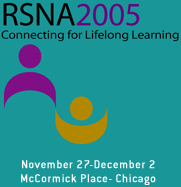
Abstract Archives of the RSNA, 2005
Bodo Paul Josef Kress MD, Presenter: Nothing to Disclose
Christoph Stippich MD, Abstract Co-Author: Nothing to Disclose
Stefan Hähnel MD, Abstract Co-Author: Nothing to Disclose
Ernst Nennig MS, Abstract Co-Author: Nothing to Disclose
Volker Tronnier MD, Abstract Co-Author: Nothing to Disclose
Dirk Rasche MD, Abstract Co-Author: Nothing to Disclose
The volume of trigeminal nerve that is affected in patients with trigeminal neuralgia is smalller than the healthy contralateral nerve. Therefore we wanted to assess whether the volume of the trigeminal nerve increases after microvascular decompression and whether the location of the Gore-Tex mebrane can be depicted.
Twenty patients with trigeminal neuralgia underwent MRI prospectively before and after (6 and 12 months) microvascular decompression. The MRI protocol included T2w and T1w sequences before and after intravenous administration of contrast. The volume of the trigeminal nerve was determined by region of interest pre- and postoperatively (Mann-Whitney-U-Test and Kruskal Wallis Test, p<0.05).
Preoperatively the volume of the affected trigeminal nerve was smaller (28.2%) than the contralateral nerve in all patients. Postoperatively the volume of the affected trigeminal nerve was always greater (6 months: 13.2%; 12 months: 14.9%) than the contralateral nerve. In all patients the location of the GoreTex membrane was clearly seen.
The volume of the trigeminal nerve affected by trigeminal neuralgia increases after microvascular decompression compared with the preoperative volume. This might be a sign for the recovery of the nerve.
Kress, B,
Stippich, C,
Hähnel, S,
Nennig, E,
Tronnier, V,
Rasche, D,
Trigeminal MRI after Microvacular Decompression Surgery (the Jannetta Operation). Radiological Society of North America 2005 Scientific Assembly and Annual Meeting, November 27 - December 2, 2005 ,Chicago IL.
http://archive.rsna.org/2005/4404662.html
Accessed September 23, 2025

